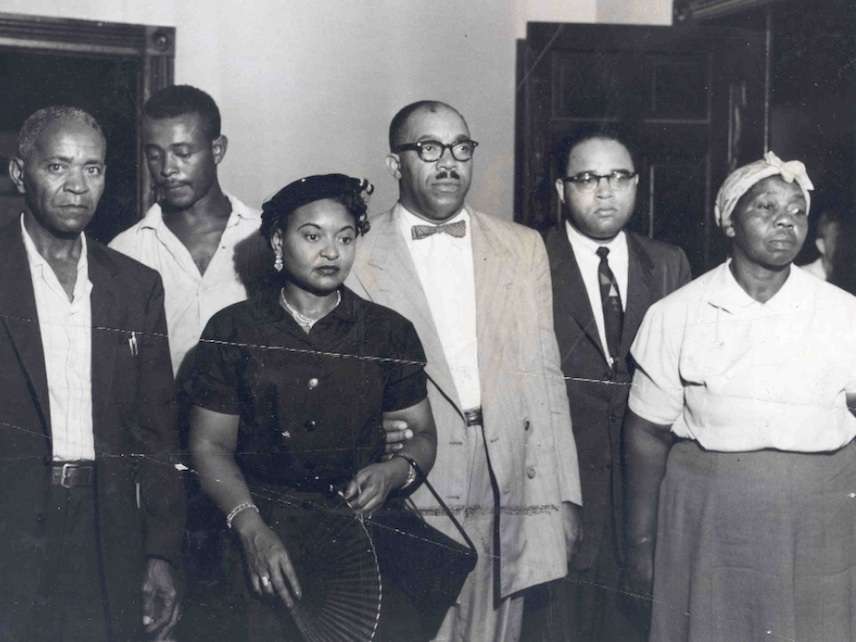How the Second Amendment Helped Civil Rights Activists Resist Jim Crow
A response to New York Times columnist Bret Stephens and his call to "repeal the Second Amendment."
Conservative New York Times columnist Bret Stephens says he has "never understood the conservative fetish for the Second Amendment" and now favors a radical change to our constitutional system. "Repeal the Second Amendment," he declares today.
As part of his case, Stephens explicitly rejects the "personal liberty" argument for gun rights. "The idea that an armed citizenry is the ultimate check on the ambitions and encroachments of government power is curious," he writes. "The Whiskey Rebellion of the 1790s, the New York draft riots of 1863, the coal miners' rebellion of 1921, the Brink's robbery of 1981—does any serious conservative think of these as great moments in Second Amendment activism?"
Perhaps Stephens should widen his gaze to include the struggle for civil rights and racial justice in the Jim Crow South, in which the Second Amendment played a noble role on the side of personal liberty.
"I'm alive today because of the Second Amendment and the natural right to keep and bear arms," declared John R. Salter Jr., the civil rights leader who helped to organize the famous sit-ins against segregated lunch counters in Jackson, Mississippi. "Like a martyred friend of mine, NAACP staffer Medgar W. Evers, I, too, was on many Klan death lists and I, too, traveled armed: a .38 special Smith and Wesson revolver and a 44/40 Winchester carbine," Salter recalled. "The knowledge that I had these weapons and was willing to use them kept enemies at bay."
Salter knew perfectly well many state and local officials were either indifferent to his well-being or were themselves affiliated with the domestic terror groups that wanted to harm him. By exercising his Second Amendment rights, Salter was able to safeguard his life and liberty in face of government malfeasance and criminality.

The same thing can be said of Mississippi civil rights activist T.RM. Howard. In 1955, Howard correctly recognized that state officials had zero interest in conducting a thorough investigation into the lynching and murder of 14-year-old Emmett Till. So Howard, a successful doctor and entrepreneur, launched his own private investigation. He located, interviewed, and kept safe a number of important witnesses, stashing them in his own house.
One of those witnesses was Till's mother, Mamie Bradley. Her testimony was crucial because it contradicted that of Tallahatchie County Sheriff Henry Clarence Strider, who insisted that the body pulled from the river was not that of Till, but was instead that of someone else "as white as I am." The sheriff, a well-known racist, was lying in the hopes of bolstering the defense's claim that outside "agitators" had faked the crime in order to stir up trouble.
Before Bradley and the other witnesses could participate in the trial, they had to get there unscathed. That's where the Second Amendment came in. To use a modern expression, Howard was a "gun nut." He slept with a Thompson submachine gun at the foot of his bed and walked around with a pistol at his waist. To keep Bradley and the others safe from hostile racist attacks—including attacks by those who wore government uniforms and wielded government power—Howard led an armed caravan to and from the courthouse.
The examples of John Salter and T.R.M. Howard are not unusual. Martin Luther King Jr. applied for a conceal-carry permit (denied by the government) and declared, "the principle of self-defense, even involving weapons and bloodshed, has never been condemned, even by Gandhi." According to civil rights hero Fannie Lou Hammer, "I keep a shotgun in every corner of my bedroom." Rosa Parks once described her dinner table "covered with guns" while activists met in her home to plot strategy.
And, of course, the idea of the Second Amendment guarding personal liberty against racist government encroachment goes back even further than the era of Jim Crow. As the abolitionist leader Frederick Douglass liked to say, "the true remedy for the Fugitive Slave Bill" is a "good revolver."
